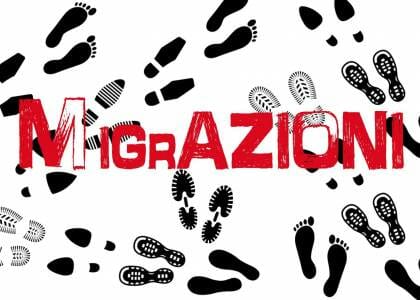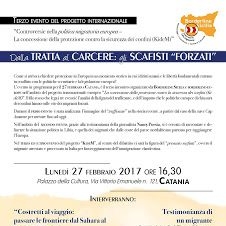The Diciotti Crisis. Interview with Prof. Mangiameli: “Migration Isn’t an Emergency, It’s A Constant Part of Our History”.
Taken from hashtagsicilia -Migration, reception, integration. These are the keywords of the “crisis” of the Ubaldo Diciotti, the ship kept for three days in the port of Catania with more than 150 migrants on board, waiting to know their own future, caught in a tug of war between the Italian government and the European Union. But they represent the leitmotif of an entire historical phase, which is seeing an every stronger flow of people in movement between continents, while Western governments remain stubborn in how they confront the situation. But migration is not new. The current period must be seen in the light of similar movements of the past. Hashtag Sicilia spoke with Rosario Mangiameli, Professor of Contemporary History at the Department of Political Science at the University of Catania.
Professor Mangiameli, does the current phase of migration we are seeing bear exceptional characteristics or are there historical precedents?
“Migration – whether immigration or emigration – has always been a normal occurrence, since the dawn of time down to today. These used to be armed migrations, such as those of the Goths, the Lombards, the Huns and the Mongols; as well as non-armed migrations, due to the drive of peoples and the search for better living conditions. There is not a single country in the world today that is immune to this phenomenon. In moments of surplus population someone leaves, and then others arrive, helping to build development. From this point of view, the USA is the best example.”
Of course it wasn’t so long ago that emigrating Italians made their way towards the USA in fact.
“But in Italy we have also always had internal migration: people didn’t only emigrate for America, Argentina, Australia but also from the southern to northern Italy. And this is really very important, because it helps us remember that migration always provokes the fear of the other. The “terroni” were the filthy, criminal southerners, while Italo-Americans were seen as all part of the Mafia. Of course there were people in the Mafia, but this was certainly not the case for everyone, just as not all Muslims are terrorists, just as not all Albanians are criminals. Every people includes great masses of workers who have contributed to the wellbeing of the country that hosts them.”
What kind of solutions can these countries adopt in order to turn past waves of migration to their advantage?
“They should use logic. The response is certainly not to stop immigration, which always comes back anyway but in underground forms. The response must be to legalise it. The greatest period of American democracy was under Roosevelt who, through the New Deal, assigned immigrants with citizenship, transforming them into a great democratic and economic resource for the USA, hauling out of a crisis. The most important thing is to face the issue with an open mind.”
Over the recent period, our city of Catania has seen the dramatic crisis of the Diciotti, still blocked at port.
“First of all I’d like to greet and show my solidarity with the friends who brought arancini to the migrants yesterday. If I had been in Catania, I would have happily gone with them. In the context of this crisis, it needs to be emphasised that immigration in itself is not an emergency, but an entire acceptable fact. It can be managed without the need to create alarm, which really serves a specific purpose.”
What purpose is this?
“Above all it serves the political instrumentalisation of the fear of the other. Then there’s also an economic goal, which is to have low-cost labour, without rights, ready for exploitation. It is precisely those who exploit these people who want to force a break between workers through creating division and social alarm. Whoever rejects legal immigration wants to create underground, illegal immigration, which can then be exploited. Regularisation would bring about very different situations in the labour market.”
Many people claim that the responsibility for this situation lies with Europe, and call for a return to national sovereignty.
“There can be no doubt that Europe has failed to some extent. Today there are no sovereign states, inasmuch as some of this sovreignty has passed over to the EU. But this is a necessity of a globalised economy, that includes economic actors more powerful, sometimes, that states themselves. A normal state in these conditions cannot manage to regulate its economy. With the old lira we would still be lacking. Sovereignism and nationalism are reactionary utopias.”
What should Europe do then?
“A European passport for those who land here might be a solution. I’m not talking about citizenship, which could come afterwards: this would be a European identity card, recognisable in different information networks, allowing someone to freely move within Europe without being stuck in ghettos, or on streets and at traffic lights, all too often falling into the hands of organised crime.”
Professor, if you found yourself in front of the Minister of the Interior, Matteo Salvini, what would you say to him about this crisis and his management of it?
“As a Catanian I would ask him to be more tolerant; as a citizen I would request a greater control over his words. Yesterday he said that the minors on the Diciotti would be disembarked, while the others can stick it out. What kind of language is this? It seems like our government, with the Minister at the head, is trying to destroy our democratic feeling through language itself. The terms need to be changed. We need to return to the language of the Italian constitution.”
Valerio Musumeci
Hashtag Sicilia
Project “OpenEurope” – Oxfam Italia, Diaconia Valdese, Borderline Sicilia Onlus
Translation by Richard Braude




